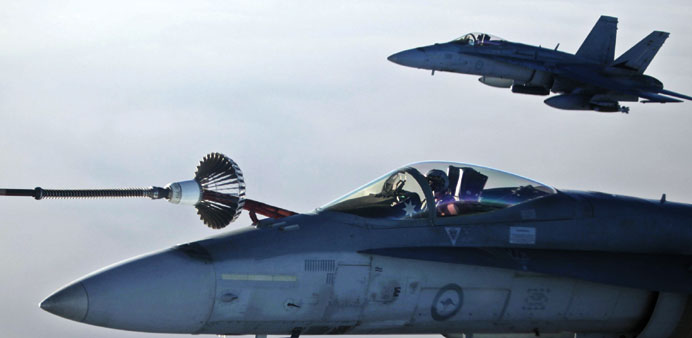This handout photo taken on Friday and released by the Royal Australian Air Force shows Royal Australian Air Force F/A-18A Hornets from Australia’s Air Task Group refueling from a Royal Australian Air Force KC-30A Multi Role Tanker Transport aircraft during the first mission of Operation OKRA to be flown over Syria.
AFP/Sydney
Australian aircraft have completed their first operation in Syria, defence officials said yesterday, just days after Canberra extended the mission from Iraq to better fight Islamic State (IS) jihadists.
“The Australian Air Task Group completed its first operational mission in Syria overnight, returning to base in the Middle East without incident,” the defence department said in a statement. “No weapons were released during the mission.”
The statement added that two Royal Australian Air Force F/A-18A Hornets, a KC-30A air-to-air refuelling aircraft, and E-7A Airborne Early Warning and Control aircraft, were used.
Australia Air Task Group Commander, Air Commodore Stu Bellingham said the Hornets were searching for enemy activity in eastern Syria, reporting to the international coalition’s Combined Air Operations Centre.
“The Hornets were also prepared for any short notice high priority tasking which could include surveillance and weapons release,” Bellingham said.
Australia was already part of the coalition fighting IS in Iraq but this week extended air operations into Syria, saying the legal basis was the collective self-defence of Iraq against the jihadist group which does not respect borders.
“We cannot defeat Daesh in Iraq without defeating Daesh in Syria too,” Prime Minister Tony Abbott said when he made the announcement, using the alternate name for the violent jihadists who control swathes of Syria and neighbouring Iraq.
Australian aircraft will continue to plan and conduct air strikes against Daesh as part of the coalition effort to disrupt and degrade the group’s stronghold, the defence department statement said.
“Daesh controls a large amount of territory in eastern Syria that serves as a source of recruitment and oil revenues, and as a base from which it continues to launch attacks into Iraq,” Bellingham added.

